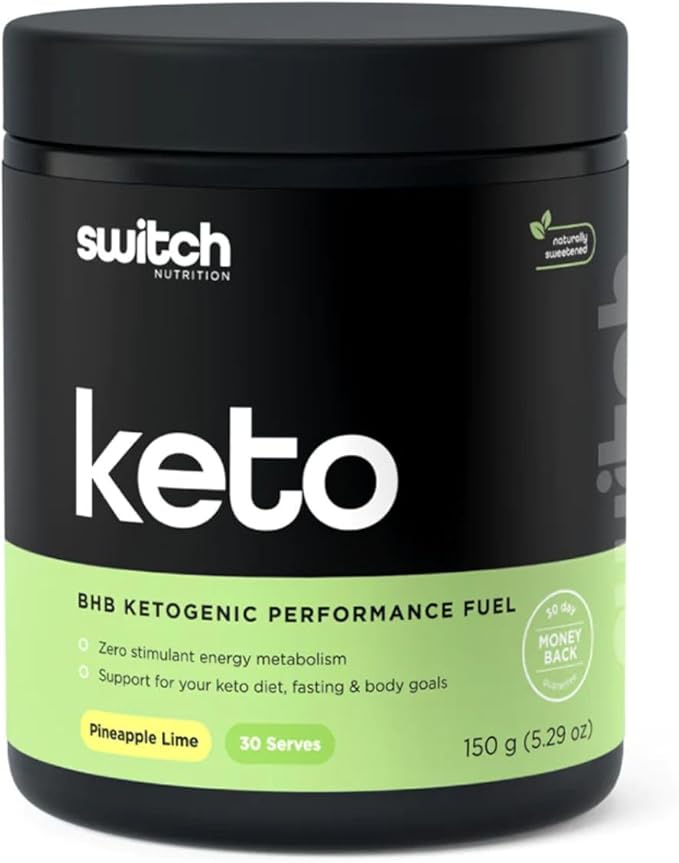There’s a debate raging about which dietary tactic is the god particle for making you leaner, faster, and healthier. How the ketogenic diet option squares off against the low-carb route is vital for understanding how exogenous ketone supplements work. To get into ketosis the natural way, you need to keep your carb intake low enough for long enough for your body to begin using use fat as fuel. Your liver then converts a portion of that fat into energy molecules called ketones. These work together with glucose as a fuel source but can kick in faster, allowing your body to operate more economically during lengthy, high-energy exercise efforts.

To be in ketosis, you need to get very specific about the macronutrient ratios hanging off your fork. This means eating 75% fats, 20% protein and 5% carbohydrates. It’ll see you getting 5-10% of your total calories from carbohydrates, which is roughly 25-30g of carbs per day, and diligently keeping this below the 50g threshold creates the ketosis that burns stored fat. Unlike the no-limit-protein option on the table when going low carb, eating more than 0.67-0.81g of protein per pound of body weight can hoof you out of ketosis because too much of it can be converted into glucose, blunting the benefits of the ketones. On the plus side, you will have a high fat intake, making your energy levels more balanced so you can train at higher intensities.
Fortunately, you don’t need to be a dietary math savant to cash in on these rewards because the supplement eggheads took the liberty of creating exogenous ketones, which act as direct substitutes to the ones your body creates. Unlike other fat burners that give you the skits jitters, these are actually helping exercisers reach new personal bests while getting leaner, and are totally legal. Here’s what you need to know to get a slice of the action safely.
What are Exogenous Ketones?
Exogenous ketones are created in a lab to accelerate both physical and mental performance. These ketone drinks were used in pro cycling races back in 2015, trading at prices that would make using your kidney as a bartering tool seems like a cut-price deal. Fortunately, they’ve now come down in cost and are used often in between meals as a way of blackmailing your body into getting into ketosis way faster.
There are three types of ketones produced when you’re on a ketogenic diet: acetoacetate, beta-hydroxybutyrate (BHB), and acetone. The kinds that you’ll find in your supplements are BHB because your body can readily use and absorb them. This means that not all ketones are created equal and there are several different types, each with unique properties that are worth considering when shopping.
- Ketone esters
These are very raw, may taste like a warmed-up dry-retch, and may upset your gut but do offer near instant energy kick as a reward. An excellent pre-workout if you can stomach them.
- Ketone salts
These ketones are bound to salts such as sodium, calcium, magnesium or potassium. They don’t quite have the punch the esters offer, but are much gentler on your insides.
- Medium chain triglycerides
If you’re nutritionally savvy, you’ll know coconut oil falls into this category and take much longer to get used as ketones by your body. Since they’re high in calories, they’re great for performance, but not so flash for fat burning.
Will they make you an MVP?
Plenty of supplements make you a fractionally better sportsman and these are no different. The synthetic exogenous ketones helped Olympic-caliber cyclists cover an average of 411 additional meters during a 30-minute time-trial, which resulted in a two percent increase in overall speed, found a paper in Cell Metabolism. That can be the difference between feeling the glorious tug of the winner’s ribbon across your chest or rolling in with the stragglers.
The Nasty Side Effects
The famous keto breath is powerful enough to throw shade on your increasingly ripped rig. The mouth-based ketones are released when your body scalds fat are responsible for the pong. Going into ketosis by changing your diet means your body doesn’t have carbs as a fuel source, so you’re using fats and proteins for energy, which fuels the potency of the fireworks seeping from your grill. The same can happen when taking supplements, but not by the same degree – proving that changing your diet is a more potent fat-burning tool. A lot of people also report gastric distress, so you could offend those you’re co-habituating with. What’s more, they can have a slight diuretic effect, which can deplete your magnesium, potassium, and sodium stores, so make sure your levels are topped up when you’re out for an extra-long exercise stint. Research in Nutrition and Metabolism on animals found there were no negative side effects, but whether this extends to humans is still up for discussion. Fortunately, you’re more likely to benefit from the upsides such as improved endurance, appetite suppression, and fat burning.
How to Use Them
With all supplements, it’s best to start off slowly and build up to the full-strength dose of the product you’re taking. Ketones are not a one-trick pony, so adopting smart usage strategies will help you achieve your goals faster.
- For more endurance
Take a dose of 30-40 minutes for any workout that lasts longer than 45 minutes. If you’re out on a long ride or run then you can use it as an intra-workout aid, nailing another half-serve, after 2 hours of training.
- For brain power
Your noggin is greedy for energy so for a solid mental lift it’s best to take a dose on an empty stomach for maximum effect. That should help you energised enough to crush those boring spreadsheets for up to 4-6 hours.
The Verdict
They’ve got enough science behind them to suggest exogenous ketones do work very well indeed, but watch out for the online ads featuring the raspberry ketone fat burners. Their name is little more than a parlour trick because this is not related in any way to ketones, a ketogenic diet, or nutritional ketosis. They are merely the natural substance that gives raspberries their sweet aroma and flavour. Just because they’re marketed at the must-have fat burner, doesn’t mean they work and are one of the most widely spread Internet scams. There aren’t any human studies to back up Raspberry’s claims so exercise a handful of caution when choosing your ketone supplier. Make sure they’re reputable, can be held accountable and are Australian-made to set yourself up to become leaner while increasing your stamina.
For more info, here’s a study: KETONE STUDY




